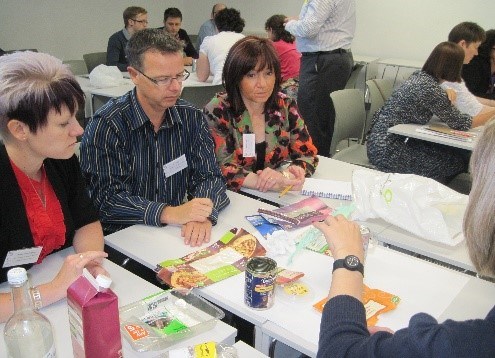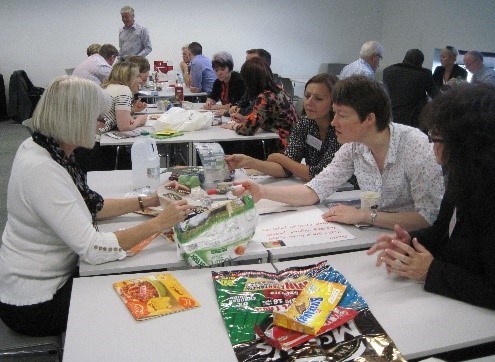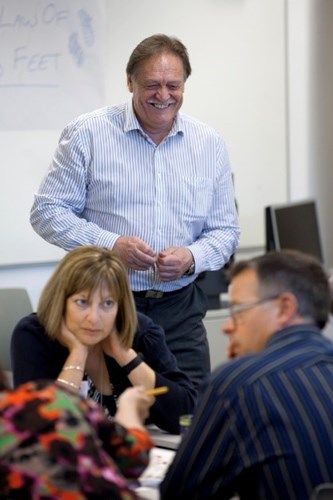Group Size
?
1.) Small group (teams of 4-6)
2.) Individual Task
3.) Large Group
4.) Any
Small group (teams of 4-6)
Learning Environment
?
1.) Lecture Theatre
2.) Presentation Space
3.) Carousel Tables (small working group)
4.) Any
5.) Outside
6.) Special
Carousel Tables (small working group)
QAA Enterprise Theme(s)
?
1.) Creativity and Innovation
2.) Opportunity recognition, creation and evaluation
3.) Decision making supported by critical analysis and judgement
4.) Implementation of ideas through leadership and management
5.) Reflection and Action
6.) Interpersonal Skills
7.) Communication and Strategy
1Creativity and Innovation
2Opportunity recognition‚ creation and evaluation
4Implementation of ideas through leadership and management
5Reflection and Action
6Interpersonal Skills
7Communication and Strategy
The garbage workshop is based on an arresting premise:
"That what people have owned -- and thrown away -- can speak more eloquently, informatively, and truthfully about the lives they lead than they themselves ever may."
The aim of the workshop is to illustrate the need for creative thinking in the undertaken of market research. Information may be gleaned from many different and often unusual sources. These serve to illustrate the methodology for gathering useful and practical market research data and analyse/develop that information in order to influence decisions made in connection with target marketing and segmentation of that marketplace. With effective market research, you can determine the need for your service, a product's likelihood to sell, target-market demographics, and desirable store locations. There are numerous ways to uncover this information—from online research to focus groups to counting customers.

To make sound business decisions, it is necessary to obtain accurate, up-to-date insights about customers, markets, and competitors. A market study helps answer these and other questions. To target your customers successfully, you should know as much about their buying habits as possible Market research is the first most essential step in developing a business concept, in order to ascertain its appropriateness to the market, potential customers for that product or service and to influence decisions made in respect of the marketing profile for the product/service. Such information can be gathered from the strangest of places on occasions and the exercise serves to illustrate both the nature of the source but also the way in which deductive reasoning is employed to rationalise and evaluate the information and to substantiate assumptions being made. Activity: Prior to the workshop, random contacts and individuals covering a wide cross section of the population are asked to retain all their food packaging material for a period of between 1 -2 weeks. This should be clean and without traces of food waste. It is kept in a plain plastic bag bearing no trace of origination or locale. Students in groups of 4 or 5 persons, are randomly given a plastic bag full of one person’s packaging material. Their task is to identify wherever possible the nature of the source of the waste materials; namely to identify as much as possible about the person who provided the materials, based upon clues within the packaging material itself and calculated assumptions made on the strength of information found therein. The facilitator works with each group to assist in decisions making and provide guidance, explanation and on occasions hints as to the source material. The deductions from each team are noted on a large sheet of paper which is then pinned on the wall and the team members feedback their results to the entire class once everyone has finished the first stage of the exercise. Other group members have the opportunity to question their assumptions and evaluate options where appropriate. Finally the facilitator reveals the true identity and profile of the “rubbish” donor and groups are able to evaluate the accuracy of their reasoning.

The impact was significant as …. a) Students are surprised that such a simple creative exercise can be both fun and highly instructional b) They become more aware of the link between products bought and the nature, values and lifestyle of the products’ customers c) A realisation that even in the waste material we throw away, there is an abundant source of information and data relating to a person’s lifestyle and buying habits that is invaluable when researching a product’s potential target customer market. d) It is essential to focus on a specific client group as very few products or services can be relevant or applicable to the entire marketplace without some form of specification or target refinement. Not to do so would result in ineffective marketing and wasted money and effort, trying to appeal to the wrong market group. The workshop was presented to IEEC in Plymouth a few years ago and was widely appreciated by all participants. Indeed I believe that a number of universities started to include it in their own enterprise programmes as it was a simple but effective, fun and engaging exercise to illustrate the concepts of effective market research and segmentation.

References: